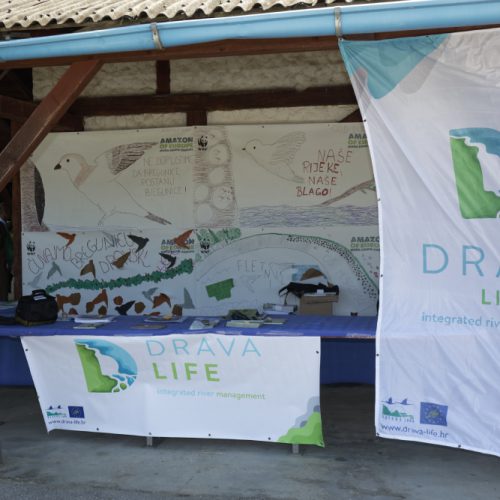News
DRAVA LIFE - Integrated River Management for people and nature
The project "DRAVA LIFE - integrated river management" wants to improve the ecological status of the Drava and improve flood protection.
Last Friday, the 5-year EU project "DRAVA LIFE - integrated management of the river" was officially opened in Legrad, Croatia. The kick-off event had a varied programme, ranging from speeces, musical entertainment to a joint Drava descent. The project aims to improve the ecological status of the Drava and its ecosystem and to improve flood protection along the 300 kilometres long stretch of the Drava River in Croatia. The project partners, led by Croatian Waters, plan to achieve this goal through various restauration activities, cross-border cooperation, awareness raising and the reduction of human disturbance to river birds, such as the little tern.
22 hydropower plants were built in Austria, Slovenia and Croatia along the Drava, leaving only a short free-flowing section of the Drava, located mostly in Croatia, which is one of the last semi-natural rivers in Central Europe.
"The benefits of the project will be multiple. Not only for the environment, but also for the people who live in the area. The introduction of modern, environmentally friendly management methods will contribute to a better flood protection in populated areas. How important that is can be seen on the catastrophic floods of 2012, when the burst of embankments caused flooding of residential houses, industrial and agricultural facilities, infrastructure and agricultural land in Varazdin and Medjimurje County. The total damage reached a total amount of over € 65 million. However, the activities within the project will also greatly benefit a number of endangered species and habitats in Natura 2000 areas. The project will increase the recreational value of the area which is used for fishing, swimming and other activities”, said Deputy Minister of Environment and Nature Protection, Dr Mario Šiljeg at the opening of the project.
Through the cooperation of Hrvatske Vode, public institution for water management, County Institutions for nature protection, and non-governmental organizations, the key features of the Drava’s natural ecosystem will be restored by opening and creating new side arms, removal and adjustment of river dikes and other water structures, as well as through the preservation of natural retention areas and steep river banks. These procedures will benefit numerous endangered species and habitats within the Natura 2000 sites.
"Restoration of the river’s backwaters will provide better flood protection within the existing floodplain areas; contribute to local lowering of water levels and diversion of watercourses in urban areas, near bridges and villages during floods. The project will also have a positive impact on groundwater supplies because it will improve the reclamation of river infiltration into the groundwater and therefore stabilize and raise the groundwater level” Sc. Zoran Đuroković, General Manager of Croatian Waters said.
The main activities of habitat restoration will be carried out at seven locations along the Drava: Island Warwick (312 to 314.3 river km), Old Country Varazdin (289.3 to 292 river km), Donja Dubrava - Legrad (240 to 241.45 rkm) Most Botovo (226.6 to 227.9 river km), Novačka (214-217 rKM), Miholjački Martinci (104-106 rKM) and Podravska Moslavina (96-98 rkm). The project partners want to restore and preserve 1,000 metres of dynamic river banks, create 13 hectares of new dynamic river zones with gravel, sand and clay shores, restore or create 14.5 kilometres of backwaters and improve 300 hectares of floodplain forests.
"DRAVA LIFE project proves that a constructive cooperation between the non-governmental sector, government institutions and local governments is possible and that all can work together for the benefit of nature and the local population. The project is also a positive example for cooperation and the work to preserve natural values, not only for Croatia, but for the whole region", Mr Sc Martin Solar, director of WWF Adria said.
During the project period partners will seek to reduce human disturbance of river birds during the breeding season and to improve the knowledge of the different Natura 2000 instruments to raise awareness amongst people. Furthermore, educational centres and paths along the Drava, information boards and points, as well as various communication and educational materials will be created. In addition, several exhibitions and campaigns will be held in cooperation with local people and schools.




